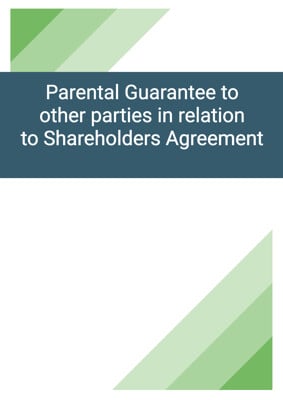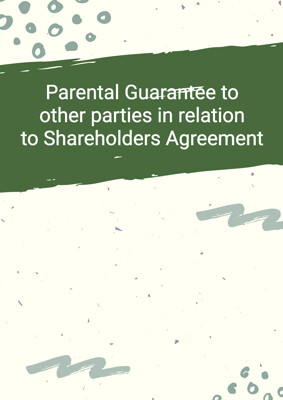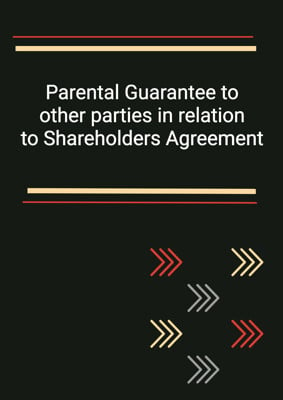How to Tailor the Document for Your Need?
01
Create Document
Fill in the details of the parties. You can click the "Fill with Member’s Information" button to complete it with information saved to your account.
02
Fill Information
Please fill in any additional information by following the step-by-step guide on the left hand side of the preview document and click the "Next" button.
03
Get Document
When you are done, click the "Get Document" button and you can download the document in Word or PDF format.
04
Review Document
Please get all parties to review the document carefully and make any final modifications to ensure that the details are correct before signing the document.
Document Preview
Document Description
This shareholders agreement is a legally binding document that governs the relations between the parties as shareholders in a jointly-owned company. The agreement highlights the importance of forming the company and outlines the terms and conditions that will guide the shareholders' relationship. It provides a detailed interpretation of key definitions used throughout the document, ensuring clarity and understanding. The agreement covers various aspects such as the establishment of the company, share capital, further finance, dividend policy, directors and management, reserved shareholder matters, transfer of shares, confidentiality, restrictions on the parties, term, costs, supremacy of the agreement, assignment, no rights of third parties, dispute resolutions, and notices and service.
The agreement begins with an interpretation section, which defines key terms used throughout the document. This ensures that all parties have a clear understanding of the terminology used. The agreement then proceeds to outline the process of establishing the company, including the incorporation and completion stages. It specifies the authorized share capital of the company and the allocation of shares among the parties.
The agreement also covers the capital structure of the company, including provisions for increasing the share capital and obtaining further finance if required. It outlines the dividend policy, stating that 50% of the consolidated profit will be distributed to the shareholders.
The document addresses the composition and functioning of the board of directors, specifying the appointment and removal procedures for directors. It also outlines the quorum and voting rights at board meetings. The reserved shareholder matters section highlights specific decisions that require the prior approval of the parties, such as issuing shares, altering the memorandum and articles, and borrowing by the company.
The agreement includes provisions for the transfer of shares, specifying the process and conditions for selling or disposing of shares. It also addresses confidentiality, restricting the parties from disclosing confidential information without consent. The document prohibits the parties from engaging in competing businesses during the term of the agreement.
The term section outlines the minimum duration of the agreement and provides provisions for termination. It also addresses the consequences of termination, including the liquidation of the company if necessary. The agreement includes provisions for default and insolvency, allowing a party to terminate the agreement in certain circumstances.
The document concludes with clauses on costs, amendment, no rights of third parties, dispute resolutions, and notices and service. These clauses ensure that the parties are aware of their obligations and rights under the agreement and provide mechanisms for resolving any disputes that may arise.
Overall, this shareholders agreement is a comprehensive and detailed document that covers all aspects of the parties' relationship as shareholders in a jointly-owned company. It provides clarity and certainty, ensuring that the parties understand their rights and obligations.
How to use this document?
1. Incorporation: As soon as possible after the date of this agreement, the parties should ensure the incorporation of the company in accordance with the specified characteristics. This includes determining the company's name, authorized share capital, and registered office.
2. Share Capital: After completion, the company should have an issued share capital divided among the parties as specified in the agreement. Any increase in share capital should be agreed upon by the parties.
3. Further Finance: If the company requires additional finance, the parties should first approach the company's own bankers. If finance cannot be obtained from the company's bankers, the parties may provide finance in equal proportions.
4. Dividend Policy: The parties intend to distribute 50% of the consolidated profit of the company each financial year. This should be reflected in the company's financial statements.
5. Directors and Management: The business and affairs of the company should be managed by the board of directors. Each party has the right to appoint and remove directors. The board should meet regularly, and decisions should be made by majority vote.
6. Reserved Shareholder Matters: Certain decisions, such as issuing shares, altering the memorandum and articles, and borrowing by the company, require the prior approval of the parties. These matters should be discussed and agreed upon.
7. Transfer of Shares: If a party wishes to sell or dispose of its shares, it should provide a transfer notice to the other party. The continuing party has the right to purchase the shares at the specified price. If no agreement is reached, the fair price should be determined by the auditors.
8. Confidentiality: The parties should maintain confidentiality regarding any information acquired in relation to the company or the other party. This information should not be disclosed without consent, except as required by law.
9. Restrictions on the Parties: During the term of the agreement, the parties should refrain from engaging in any competing business, except for permitted investments.
10. Term and Termination: The agreement has a minimum duration, and either party can terminate it by giving prior notice. Termination may also occur in the event of default, insolvency, or breach of obligations.
11. Costs: The costs of incorporating the company will be borne by the company. Each party is responsible for its own costs related to the preparation and execution of the agreement.
12. No Partnership or Agency: The agreement does not create a partnership or agency relationship between the parties. Each party is responsible for its own actions and cannot bind the other party.
13. Entire Agreement: This agreement, along with any other agreements entered into on completion, constitutes the entire agreement between the parties. No other representations or warranties are considered unless expressly stated.
14. Mutual Consultation and Goodwill: The parties should consult and act in good faith to promote the best interests of the company. They should work together to ensure the success of the business.
15. Assignment: The agreement cannot be assigned or transferred by any party without the consent of the other party, except for the transfer of shares in accordance with the agreement.
16. Conditions Precedent: If specified, completion of the agreement is subject to certain conditions precedent. The parties should ensure that these conditions are fulfilled or waived before completion.
17. Amendment: Any variation of the agreement must be in writing and signed by the parties. Variations do not constitute a waiver of any provisions and do not affect accrued rights and obligations.
18. No Rights of Third Parties: Only the parties to the agreement have the right to enforce its terms. No third party has any rights under the agreement.
19. Dispute Resolutions: Any disputes arising from the agreement should be resolved through negotiation and mutual agreement. If necessary, legal proceedings should be conducted in the jurisdiction specified in the agreement.
20. Notices and Service: All notices under the agreement should be in writing and served by email, hand delivery, or registered post. The addresses and contact details of the parties should be kept up to date. The agreement specifies the deemed time of service for each method of delivery.
Not the right document?
Don’t worry, we have thousands of documents for you to choose from:


























